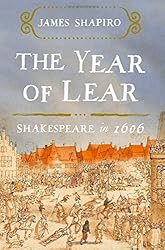 James Shapiro’s new book The Year of Lear: Shakespeare in 1606 explores the period in which William Shakespeare wrote three of his greatest and most well-known plays: King Lear, Macbeth, and Antony and Cleopatra. Beginning with the Gunpowder Plot’s discovery on November 5, 1605, Shapiro explores the ways in which the political events of 1606 shaped the plays that Shakespeare wrote. Shapiro has turned the microscope on a year in the life of Shakespeare in the past. His book A Year in the Life of Shakespeare: 1599 explores the year in which Shakespeare finished Henry V, and wrote Hamlet, Julius Caesar, and As You Like It. The Essex Rebellion and aging Queen Elizabeth figure large in that previous book as King James, the Gunpowder Plot, recusant Catholics, and the quest to unite the kingdoms of England and Scotland figure in this new book.
James Shapiro’s new book The Year of Lear: Shakespeare in 1606 explores the period in which William Shakespeare wrote three of his greatest and most well-known plays: King Lear, Macbeth, and Antony and Cleopatra. Beginning with the Gunpowder Plot’s discovery on November 5, 1605, Shapiro explores the ways in which the political events of 1606 shaped the plays that Shakespeare wrote. Shapiro has turned the microscope on a year in the life of Shakespeare in the past. His book A Year in the Life of Shakespeare: 1599 explores the year in which Shakespeare finished Henry V, and wrote Hamlet, Julius Caesar, and As You Like It. The Essex Rebellion and aging Queen Elizabeth figure large in that previous book as King James, the Gunpowder Plot, recusant Catholics, and the quest to unite the kingdoms of England and Scotland figure in this new book.
As I am currently finishing up a unit on King Lear, I was most fascinated by the connections Shapiro made between the intrigues of 1606 and that particular play, but I also gained a great deal of insight into Macbeth, a play I have taught more times than any other save perhaps Romeo and Juliet. Shapiro’s research is meticulous. When he doesn’t know or where the records are patchy, he speculates, but his educated guesses make a lot of sense in the context of the times and the plays. I haven’t actually read Antony and Cleopatra in many years, and if this book has a weakness, it is perhaps that it doesn’t explore that play in the same detail as it does the other two; however, this book is not meant to be literary criticism as much as an exploration of history’s influence on literature.
James inherited both the kingdoms of England and Scotland. Having been king of Scotland since infancy, he was eager to see his two kingdoms united and spent much of the year attempting to convince Parliament to approve the union. The division between Protestants and Catholics was at a peak, as Catholics were urged to take the Oath of Allegiance and to take communion at church. Shakespeare’s own home in Warwickshire was a hotbed of conspiracy and recusancy, and his own family was not immune. Shakespeare seemed to be at the heart of all the most important political events of the year—even a fresh outbreak of the plague touched him and influenced his plays in ways that modern audiences have difficulty appreciating.
I will read anything Shapiro writes about Shakespeare. He’s one of the most interesting Shakespearean scholars writing today. He manages to stimulate and challenge even those who think they know Shakespeare and have a thorough understanding of a given play, but he also manages to write accessibly and engagingly enough for the lay reader.
Rating:




I’ve only ever read Shapiro’s book about forging Shakespearean items, Contested Will?, and I thought it was excellent. This and 1599 both sound fascinating, even though I do generally avoid sort of biographical studies of Shakespeare — it’s so much speculation, and I never feel I’ve learned something solid.
Jenny @ Reading the End recently posted…Bombay fornicators
His are really good. There is actually a bit more biographical information out there than the anti-Stratfordian conspiracy theorists would have you believe. His two books focused on a single year, both 1599 and 1606, are excellent, excellent books.